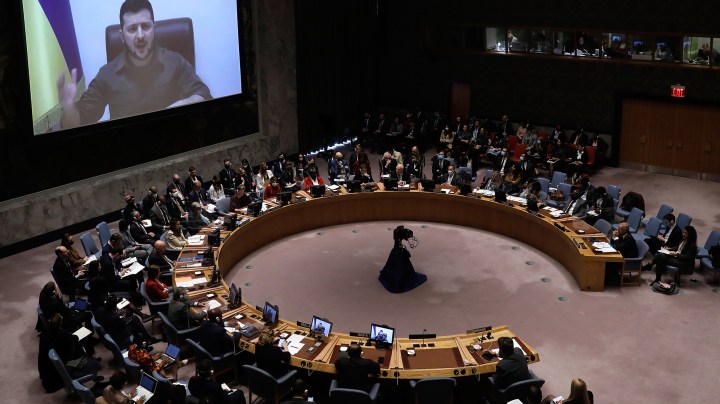RUSSIA-UKRAINE WAR OP-ED
Unpacking a peace process that Ukraine ought to seriously consider

A fair deal to end the war would probably leave everyone feeling dissatisfied, but it would be a great improvement on every feasible alternative. Both sides must make gains that exceed losses, without losing face.
In 1943, progressives had a moral duty to dismiss calls for a negotiated settlement with Adolf Hitler. Cutting a deal with the Nazis to end the carnage would have been unforgivable. Civilised people had only one option: to keep fighting until Allied troops stood over Hitler’s Berlin bunker. Today, by contrast, it would be a grave error to aim for a final military victory over Russia and to dismiss those of us calling for an immediate negotiated peace.
In 1943, the countries gunning for final victory had skin in the game, with Allied troops and, in many cases, civilian populations, on the frontline. Today, the West acts like the US did before the Japanese attack on Pearl Harbor: standing on the sidelines, arming and cheering those who are doing the actual fighting. Under the circumstances, urging Ukrainians to deliver a final victory against Russia, when Nato is not even thinking of putting boots on the ground or warplanes in the air, is both hypocritical and irresponsible.
Given that cornering Putin in some Moscow bunker cannot sensibly be the West’s endgame, what would a final victory for Ukraine look like?
Understandably, Ukrainians dream of pushing Russian troops at least back to where they were before February 24 — a tall order despite the huge ongoing airlift of state-of-the-art US weaponry. What is far more likely is that, after having dug in on Ukraine’s Black Sea coast and in the eastern Donbas region, Putin will call for a ceasefire. In that case, a slow-burning war of attrition — a cross between Syria and Cyprus — would become the most likely outcome.
But, even in the unlikely event that Ukrainian fighters succeed in pushing Russian troops all the way back, a wounded Russian regime would always find ways to impede Ukraine’s path to a semblance of normalcy. Only regime change in Moscow, of a very particular type, is consistent with the notion of a final Ukrainian victory.
How likely is such a serendipitous outcome for Ukraine and Nato? And how reasonable is it to wager Ukraine’s future on it, especially in view of the West’s sorry track record on attempts at regime change?
In fact, most evidence points in the opposite direction. While the war is going badly for Putin, the economic war is working rather nicely for him. Granted, underprivileged Russians are suffering, skilled workers are fleeing, and many industries are running out of parts. Even so, according to Robin Brooks of the Institute of International Finance, a gigantic current-account surplus is in the making (projected to reach $200-billion to $250-billion in 2022, up from the $95.8-billion estimated in April). No wonder the rouble has recovered fully.
This massive windfall allows Putin’s regime easily to finance a long-term war of attrition in Ukraine. Many Russians will be impoverished, and their economy will be condemned to long-term stagnation.
But, on Putin’s chessboard, ordinary Russians are mere pawns whose sacrifice is acceptable, if not necessary, to inflict long-term damage on Ukraine while waiting for ruptures to appear within Nato — especially once the fickle Western media turn their attention to other matters.
In this context, calls for a final Ukrainian victory gravitate toward a wholesale defeat for everyone — except perhaps arms dealers and the fossil-fuel industry, whose fortunes the war has mightily revived. Prospects of a Ukrainian economic miracle funded by the European Union will wither.
Europe is already suffering economically, and the developing world is in the early stages of a spiral of hunger and forced migration, triggered by the disruption of grain and fertiliser imports normally sourced in Ukraine and Russia. Only a negotiated peace can snatch victory — defined as better outcomes for Ukraine, Europe and humanity — from the jaws of multiple defeats.
It is at this point that charges of “Westsplaining” — or worse of “doing Putin’s bidding” — are hurled at those of us cautioning against the narrative of a final Ukrainian victory.
“Who are you to tell Ukrainians what to do?” is a common refrain. Respectful of their agency, I shall leave the question unanswered and, instead, focus on how best to support Ukrainians now.
We know that those caught up in war must economise on offers of negotiations, lest they be branded weak. Nonetheless, Ukrainian president Volodymyr Zelensky confirmed earlier this month that the war cannot end without negotiations.
“Despite the fact that they are destroying our bridges,” he said, “I believe that not all bridges have been destroyed yet.” It should be the job of those of us not directly involved in the war to help the combatants envisage what a negotiated peace may look like — and to say the things that they cannot afford to say before the negotiations begin.
A fair deal, we must agree, should leave everyone somewhat dissatisfied, while constituting a great improvement over every feasible alternative. Both sides must make gains that far exceed their losses, without losing face. To honour the Ukrainians’ aspirations and valiant resistance to Putin’s aggression, the envisaged peace treaty must decree that Russian troops withdraw to their pre-February 24 bases. To deal with sectarian clashes in the Donbas and surrounding areas, the Good Friday Agreement (which ended the Troubles in Northern Ireland) can offer tangible guidance on conflict resolution and governance. And, to assuage fear of military re-engagement, a wide demilitarised buffer zone around the Russian-Ukrainian border ought to be included.
Would Putin agree? Possibly, if the treaty offers him three things.
Putin will want most sanctions lifted. He will also want the issue of Russia’s annexation of Crimea in 2014 to be kicked into the long grass, to be resolved at some undefined time in the future. And he will want security guarantees that only the US can provide, including the lure of a seat at the top table where new security arrangements in Europe must be hammered out.
Ukraine needs similar security guarantees, from both the US and Russia, so Ukraine’s friends should be planning such arrangements, under the auspices of the UN and involving the US and the EU.
There are, of course, no guarantees that a negotiated peace will work. What is certain is that not trying, owing to the delusion of a final victory, would be unforgivable. Project Syndicate/DM168
Yanis Varoufakis, a former finance minister of Greece, is leader of the MeRA25 party and professor of economics at the University of Athens.
This story first appeared in our weekly Daily Maverick 168 newspaper, which is available countrywide for R25.

[hearken id=”daily-maverick/9588″]






 Become an Insider
Become an Insider
It is easy to stand on the side lines & recommend Ukrainians accept Russia’s criminal aggression. Sadly, there are no options for Ukraine or Western Democracies. Any appeasement of…any victory by…Vladimir Putin would be a historical error. Putin is one of history’s psychopathic thugs (aside from being the world’s wealthiest criminal and, indeed, individual). This must end in his defeat or death. Anything less would give the international community the wrong message, just as Putin has ‘received’ the wrong message over the years, as his frequent transgressions of civilized norms mounted.
Mr Varoufakis, being pragmatic in the 3rd party is one thing, but I submit your perspective may be different when measured against this “closer to home” analogy:
Would Rhodes and Crete be a price that Greece would be willing to pay in the event of a war with Turkey?
(this exact question is posed in another DM article today)
How do you negotiate in good faith with a criminal regime?
Concessions will simply allow the regime to regroup, lick its wounds and continue the offensive in a couple of years. Putin has stated that he does not believe that Ukraine is a real country. It is his obsession to wipe it out culturally.
I think it’s good that someone starts thinking seriously about what a prospective peace deal looks like. President Zelensky himself has indicated that only negotiations can bring an end to the war. It’s worth quoting the article’s final paragraph:
“There are, of course, no guarantees that a negotiated peace will work. What is certain is that not trying, owing to the delusion of a final victory, would be unforgivable.”
A retrospective look at the Paris peace talks that brought an end to the Vietnam war could be instructive. After three and a half years of acrimonious talks and broken promises, the rise of a vocal and popular anti-war movement in the US, a strong offensive from the North into South Vietnam, and a US presidential election (regime change?) the US withdrew its troops and exchanged POWs with its adversary. Hindsight being 20/20 it was an ignominious defeat for the US and incurred a tremendous and largely unnecessary loss of human lives. What have we learned?
A rise in the current account surplus is not a sign of prosperity as we well know in South Africa. It is a sign that producers are no longer importing machinery and parts for the production of goods. Russia has lost 25% of its gas exports and is funding an enormous war effort. It has lost thousands of young men who would have produced goods and services. Hopefully this will lead it to not invade other European countries.
Any solution that does not make Russia responsible for repatriations to Ukraine will not have achieved any reason for Ukraine to be part of the settlement. This would have wasted the lives of Ukrainians who have been killed by Russia’s invasion.
The key to ANY settlement must be rebuilding the vital workings of Ukraine’s economy and this must be at a cost to Russia.
the narrative about ‘the west’ or nato being the opposition to putin that supports Ukraine is misleading in the extreme. With the exception of China, India and SA plus russia’s little satellite dictatorships the opposition is global. Japan, South Korea, Singapore, Mexico, most of South America, etc. The cost to consumers is modest given what is at stake – somebody wrote it amounts to giving up two fancy coffees per day. Putin must withdraw entirely including stopping his support for separatists in eastern Ukraine. Putin must pay in full for restoring Ukraine, through a 30% duty on all russian products until Ukraine is rebuilt. It is as much about this war as a message to all nations with ideas to invade others.
And what of Putin’s war crimes Mr Varoufakis? Should they be swept under the carpet in pursuing a negotiated settlement with Putin? Surely not. Can Putin be trusted to adhere to the terms of any negotiated settlement that gives him less than what he set out to gain? Only a decisive victory for Ukraine will guarantee her survival.